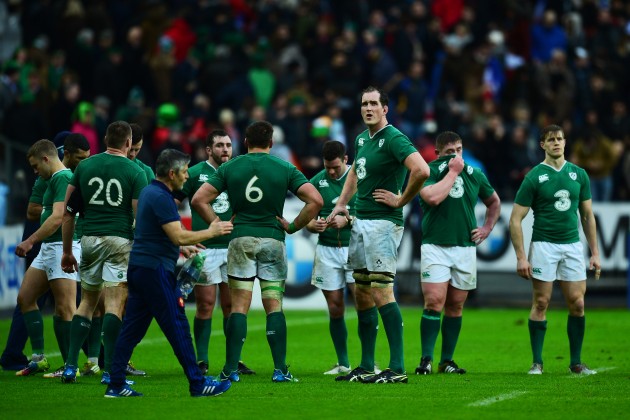Ireland fell to an agonising one-point loss against a vulnerable French outfit and there is frustration that Joe Schmidt's men approach the England game winless
By Whiff of Cordite
Ireland’s Six Nations three-peat hopes are all but over after a dispiriting one point defeat in Paris. The game was eye-bleedingly poor and was undoubtedly the lowest point of Joe Schmidt‘s competitive reign. The French try, when it came, was after a ten-minute scrum and felt inevitable, in a similar way the Welsh try last week. It’s hard to argue that Schmidt’s methods don’t produce results, but three points in two second-halves tells a story of its own. So what did we learn?
Calling Mike Ross. Ireland needs you
There’s no point denying it, Ireland still are heavily reliant on old Mike Ross. Since the 2011 Six Nations, the Wales and France games are the third and fourth competitve outings not started by Ross.

Man in the middle: Mike Ross is still invaluable to Ireland at the set-piece
Nathan White struggled again, and if Ireland are to get out of Twickenham alive – we mean with two points in the bag – they need Ross back to shore up the scrum, or hope Mako Vunipola reverts to his wet-behind-the-ears 2013 scrummaging ability. With any luck the former is more likely.
Leaders lacking
As well the aforementioned Ross, Ireland are missing huge chunk of leaders in the pack – Paul O’Connell has retired but Peter O’Mahony, Cian Healy, Sean O’Brien (when he made a cameo 20 minutes) and Iain Henderson have left big personality and leadership holes.

Leadership void: The likes of Peter O’Mahony has left a big gap in the Ireland pack
The replacements are all players with ability – indeed Healy may not be first choice – but you can’t replace hundreds of caps worth of international experience and not suffer the consequences.
Lack of breakdown threat
Linked to that is the strengh of our breakdown work…or lack of strength on Saturday. Ireland players have excelled at ball presentation and accurate clearouts under Schmidt, and the inability to manufacture any sort of decent possession meant our somewhat predictable attack became utterly predictable.

Taking contact: CJ Stander and the Ireland backrow have carried hard but not much end result
Our backrowers haven’t passed much this Championship, preferring contact and we haven’t been able to turn that into any kind of front-foot ball. The plan to actually score tries isn’t clear anyway, but with no ball, we aren’t threatening the whitewash.
Non-impact bench
Ireland (until the RWC quarter final anyway) have made a virtue out of something that was a weakness in the fag end of Deccie’s reign – the bench. Not this time though – while Tommy O’Donnell was one of Ireland’s better players, the backup front row forwards had a torrid time.

Thinking to do: Joe Schmidt may make changes on the bench for England
Fergus McFadden replicated his Leinster form this season, and Ian Madigan‘s first act was to overcook a restart. Injuries are exposing Ireland’s lack of depth, but Ulster followers (not just supporters) will point to Paddy Jackson and Craig Gilroy and wonder what difference they could have made
Ireland’s midfield: defensive lynchpins but attacking void
Ireland’s centres, Robbie Henshaw and Jared Payne, both had excellent games in defence, but aren’t providing much of an attacking force when outside backs are picked as much on their rucking as their try scoring.

No way through: Jared Payne and Robbie Henshaw are brilliant defenders but lack in the creativity stakes
The players themselves are good, but when starved of primary possession, we don’t seem able to manufacture try-scoring opportunities. Winning by defence is fine when you eke out enough points, but a scoreless second half hinted that we are doing isn’t quite working. Domestic backline selection debates (always involving Ulster players!) are a moot point if kick-chase and rucking remains the plan .. and we can’t execute it





